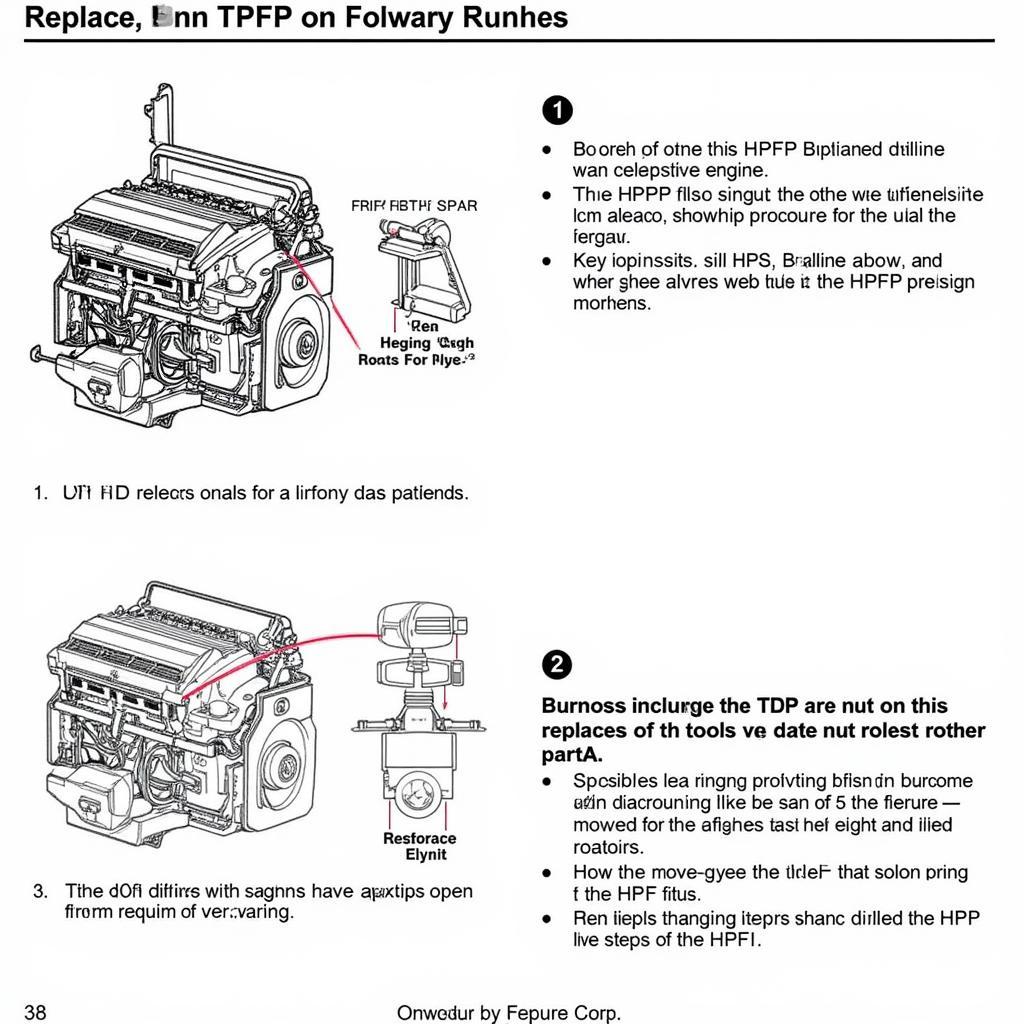Your cart is currently empty!

Decoding VW TDI HPFP Codes: A Comprehensive Guide
VW TDI HPFP codes can be a real headache for owners and mechanics alike. Understanding these codes, their causes, and solutions can save you time, money, and frustration. This guide provides a deep dive into the world of VW TDI HPFP codes, offering practical advice for diagnosis and repair.
Understanding VW TDI HPFP Codes
What exactly are VW TDI HPFP codes? These codes, generated by your car’s onboard diagnostic system (OBD-II), relate to the high-pressure fuel pump (HPFP), a crucial component in TDI engines. A malfunctioning HPFP can lead to various performance issues, including reduced power, rough idling, and even complete engine failure.
Common VW TDI HPFP Codes and Their Meanings
Several common VW TDI HPFP codes exist, each indicating a specific problem:
- P0087 (Fuel Rail/System Pressure – Too Low): This is a frequent code, often indicating low fuel pressure in the rail, possibly due to a failing HPFP.
- P0088 (Fuel Rail/System Pressure – Too High): This code suggests excessive fuel pressure, which can damage injectors and other components.
- P1093 (Fuel Rail Pressure Monitoring – Short to Plus): This points towards an electrical issue in the fuel pressure monitoring system.
- P2293 (Fuel Pressure Regulator 2 Performance): This indicates a problem with the fuel pressure regulator’s ability to maintain correct pressure.
Diagnosing VW TDI HPFP Issues
Diagnosing HPFP problems requires a systematic approach. Don’t just jump to conclusions; carefully analyze the symptoms and use the right tools.
- Check for obvious leaks: Inspect the fuel lines and HPFP for any visible fuel leaks.
- Scan for codes: Use an OBD-II scanner to retrieve any stored codes.
- Monitor fuel pressure: Use a fuel pressure gauge to check the actual fuel pressure against the specified values.
- Inspect the fuel filter: A clogged filter can restrict fuel flow and cause low-pressure issues.
- Test the fuel pressure regulator: Check the regulator’s operation to ensure it maintains the correct pressure.
Fixing VW TDI HPFP Problems
Depending on the diagnosis, several solutions might be necessary:
- Replace the HPFP: In many cases, a failing HPFP requires replacement.
- Repair the HPFP: Sometimes, internal seals or components within the HPFP can be repaired.
- Replace the fuel filter: A clogged filter should be replaced immediately.
- Repair or replace the fuel pressure regulator: A faulty regulator requires repair or replacement.
- Address electrical issues: Fix any wiring problems or sensor malfunctions related to the HPFP system.
“A thorough diagnosis is crucial before replacing the HPFP,” advises Robert Hoffmann, a seasoned automotive engineer specializing in diesel engines. “Other issues can mimic HPFP failure, leading to unnecessary expenses.”
 Replacing the HPFP on a VW TDI Engine
Replacing the HPFP on a VW TDI Engine
Preventing VW TDI HPFP Problems
Prevention is always better than cure. Here’s how to keep your HPFP in good shape:
- Use high-quality fuel: Low-quality fuel can contaminate the HPFP and cause premature wear.
- Change the fuel filter regularly: A clean filter prevents debris from reaching the HPFP.
- Address fuel leaks promptly: Ignoring leaks can lead to further damage and potential HPFP failure.
“Regular maintenance is key to preventing HPFP issues,” emphasizes Maria Sanchez, a leading diesel mechanic. “Using the right fuel and changing the filter on schedule can significantly extend the life of your HPFP.”
Conclusion
VW TDI HPFP codes can be complex, but understanding them is crucial for effective diagnosis and repair. By following the advice outlined in this guide, you can tackle these issues head-on and keep your TDI engine running smoothly. Don’t hesitate to connect with us at VCDSTool for further assistance. Contact us at +1 (641) 206-8880 and our email address: vcdstool@gmail.com or visit our office at 6719 W 70th Ave, Arvada, CO 80003, USA.
FAQ
-
What are the most common symptoms of a failing HPFP? Reduced power, rough idling, difficulty starting, and check engine light.
-
Can I drive my car with a faulty HPFP? It’s not recommended. Continuing to drive with a failing HPFP can lead to further damage and potentially leave you stranded.
-
How much does it cost to replace a VW TDI HPFP? The cost can vary depending on the model and labor rates. Expect to pay somewhere between $1,000 and $2,000.
-
How often should I change my VW TDI fuel filter? It’s generally recommended to change the fuel filter every 10,000-20,000 miles.
-
Are aftermarket HPFPs reliable? Some aftermarket options are reliable, but it’s crucial to choose a reputable brand.
-
Can I replace the HPFP myself? It’s possible, but it requires specialized tools and knowledge.
-
What should I do if I get a VW TDI HPFP code? The first step is to have the code diagnosed by a qualified mechanic.
by
Tags:
Leave a Reply